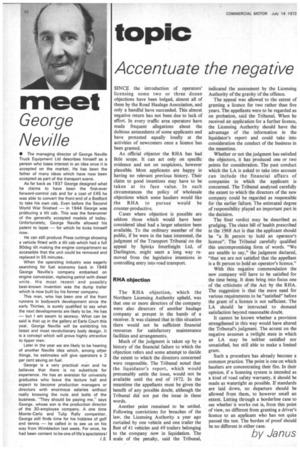topic
Page 52

If you've noticed an error in this article please click here to report it so we can fix it.
Accentuate the negative
SINCE the introduction of operators' licensing some two or three dozen objections have been lodged, almost all of them by the Road Haulage Association, and only a handful have succeeded. This almost negative return has not been due to lack of effort. In every traffic area operators have made frequent allegations about the dubious antecedents of some applicants and have protested equally loudly at the activities of newcomers once a licence has been granted.
As official objector the RHA has had little scope. It can act only on specific evidence and not on suspicions, however plausible. Most applicants are happy in having no relevant previous history. Their claim to good intentions may have to be taken at its face value. In such circumstances the policy of wholesale objections which some hauliers would like the RHA to pursue would be counter-productive.
Cases where objection is possible are seldom those which would have been considered ideal had a larger selection been available. To the ordinary member of the public, if he were in the least interested, the judgment of the Transport Tribunal on the appeal by Spinks Interfreight Ltd, of Darlington, might seem a long way removed from the legislative intentions in controlling entry into road transport.
RHA objection
The RHA objection, which the Northern Licensing Authority upheld, was that one or more directors of the company were also directors of another haulage company at present in the hands of a receiver. It was claimed that in this situation there would not be sufficient financial resources for satisfactory maintenance facilities and arrangements.
Much of the judgment is taken up by a history of the financial failure to which the objection refers and some attempt to decide the extent to which the directors concerned were responsible. The Tribunal noted that the liquidator's report, which would presumably settle the issue, would not be available until the end of 1972. In the meantime the appellants must be given the benefit of any possible doubt, although the Tribunal did not put the issue in these words.
Another point remained to be settled. Following convictions for breaches of the law, the Licensing Authority a year ago curtailed by one vehicle and one trailer the fleet of 41 vehicles and 49 trailers belonging to the company now in liquidation. The scale of the penalty, said the Tribunal, indicated the assessment by the Licensing Authority of the gravity of the offence.
The appeal was allowed to the extent of granting a licence for two rather than five years. The appellants were to be regarded as on probation, said the Tribunal. When he received an application for a further licence, the Licensing Authority should have the advantage of the information in the liquidator's report and could take into consideration the conduct of the business in the meantime.
Whether or not the judgment has satisfied the objectors, it has produced one or two points for consideration. The past conduct which the LA is asked to take into account can include the financial affairs of companies in which the applicant is concerned. The Tribunal analysed carefully the extent to which the directors of the new company could be regarded as responsible for the earlier failure. The estimated degree of responsibility played an important part in the decision.
The final verdict may be described as grudging. The clean bill of health prescribed in the 1968 Act is that the applicant should be "a fit person to hold an operator's licence". The Tribunal carefully qualified this uncompromising form of words. "We are unable to say," the judgment declared, "that we are not satisfied that the appellant is a fit person to hold an operator's licence."
With this negative commendation the new company will have to be satisfied for the time being. It does bring into focus, one of the criticisnis of the Act by the RHA. The suggestion is that the mere need for various requirements to be "satisfied" before the grant of a licence is not sufficient. The LA should be instructed to demand satisfaction beyond reasonable doubt.
It cannot be known whether a provision strengthened in this way would have altered the Tribunal's judgment. The accent on the negative assumes a twilight state in which an LA may be neither satisfied nor unsatisfied, but still able to make a limited grant.
Such a procedure has already become a common practice. The point is one on which hauliers are concentrating their rue. In their opinion, if a licensing system is intended as a kind of road safety warranty, it should be made as watertight as possible. If standards are laid down, no departure should be allowed from them, to however small an extent. Letting through a borderline case to see whethei. it works out is, from this point of view, no different from granting a driver's licence to an applicant who has not quite passed the test. The burden of proof should be no different in either case.
by Janus






























































































